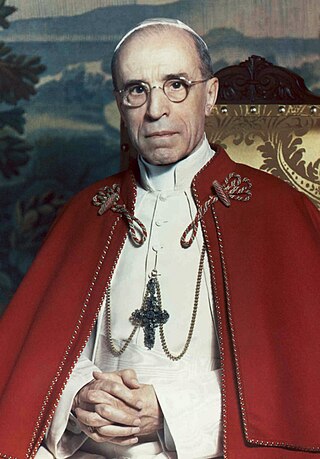
Pope Pius XII was head of the Catholic Church and sovereign of the Vatican City State from 2 March 1939 until his death in October 1958. Before his election to the papacy, he served as secretary of the Department of Extraordinary Ecclesiastical Affairs, papal nuncio to Germany, and Cardinal Secretary of State, in which capacity he worked to conclude treaties with various European and Latin American nations, including the Reichskonkordat treaty with the German Reich.

Vatican City, officially the Vatican City State, is a landlocked sovereign country, city-state, microstate, and enclave within Rome, Italy. It became independent from Italy in 1929 with the Lateran Treaty, and it is a distinct territory under "full ownership, exclusive dominion, and sovereign authority and jurisdiction" of the Holy See, itself a sovereign entity under international law, which maintains the city-state's temporal power and governance, diplomatic, and spiritual independence. The Vatican is also a metonym for the pope, the city-state's and worldwide Catholic Church government Holy See, and Roman Curia.

Giuseppe Pizzardo was an Italian cardinal of the Catholic Church who served as prefect of the Congregation for Seminaries and Universities from 1939 to 1968, and secretary of the Holy Office from 1951 to 1959. Pizzardo was elevated to the cardinalate in 1937.
Riccardo Galeazzi-Lisi was an Italian medical doctor who served as Pope Pius XII's personal physician from 1939 until his dismissal in 1958. During his service in the Vatican he was officially titled "Archiatra Pontificio". The pope also made him an honorary member of the Pontifical Academy of Sciences. He managed to be present at the 1958 death of Pius XII and created a scandal in this context with his attempt to publish pictures and stories about the dying pontiff. He was also a member of the International Society for the History of Medicine.

Fiorenzo Angelini was an Italian cardinal of the Roman Catholic Church. He served as the President of the Pontifical Council for the Pastoral Care of Health Care Workers in the Roman Curia, and was elevated to the cardinalate in 1991. When Cardinal Ersilio Tonini died on 28 July 2013, Cardinal Angelini became the oldest living cardinal until the next consistory where Pope Francis appointed 98-year-old Archbishop Loris Francesco Capovilla as a cardinal.

David Israel Kertzer is an American anthropologist, historian, and academic, specializing in the political, demographic, and religious history of Italy. He is the Paul Dupee, Jr. University Professor of Social Science, Professor of Anthropology, and Professor of Italian Studies at Brown University. His book The Pope and Mussolini: The Secret History of Pius XI and the Rise of Fascism in Europe (2014) won the 2015 Pulitzer Prize for Biography or Autobiography. From July 1, 2006, to June 30, 2011, Kertzer served as Provost at Brown.
The Dicastery for Legislative Texts, formerly named Pontifical Council for Legislative Texts, is a dicastery of the Roman Curia. It is distinct from the highest tribunal or court in the Church, which is the Supreme Tribunal of the Apostolic Signatura, and does not have law-making authority to the degree the Pope and the Holy See's tribunals do. Its charge is the interpretation of existing canon laws, and it works closely with the Signatura and the other Tribunals and the Pope. Like the Signatura and the other two final appellate Tribunals, the Roman Rota and the Apostolic Penitentiary, it is led by a prefect who is a bishop or archbishop.
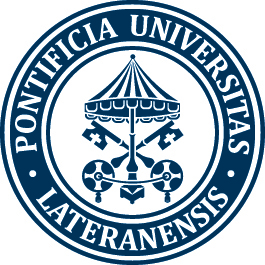
The Pontifical Lateran University, also known as Lateranum, is a pontifical university based in Rome. The university also hosts the central session of the Pontifical John Paul II Institute for Studies on Marriage and Family. The university is known as "The Pope's University". Its Grand Chancellor is the Vicar General to the Holy Father for the Diocese of Rome. As of 2014 the Pontifical Lateran university had students from more than a hundred countries. It is also sometimes also known as the Pontifical University of Apollinaire.

Ernesto Ruffini was an Italian cardinal of the Catholic Church who served as Archbishop of Palermo from 1945 until his death, and was elevated to the cardinalate in 1946 by Pope Pius XII.

Benedetto Aloisi Masella was an Italian cardinal of the Roman Catholic Church who served as prefect of the Discipline of the Sacraments from 1954 to 1968, and as chamberlain of the Roman Church from 1958 until his death. Aloisi Masella was elevated to the cardinalate in 1946 by Pope Pius XII, whom he designated to canonically crown Our Lady of Fatima.

Valerio Valeri was an Italian Cardinal of the Catholic Church. He served as Prefect of the Sacred Congregation for Religious in the Roman Curia from 1953 until his death, and was elevated to the cardinalate in 1953 by Pope Pius XII.

Gaetano Cicognani was an Italian cardinal of the Catholic Church. He served as prefect of the Apostolic Signatura from 1954 until his death, and was elevated to the cardinalate in 1953 by Pope Pius XII. To date, he and his brother, Amleto Giovanni Cicognani, are the last pair of brothers to serve simultaneously in the College of Cardinals.
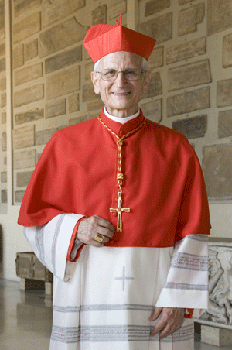
Raffaele Farina SDB is an Italian cardinal of the Catholic Church. He was Archivist of the Vatican Secret Archives, Librarian of the Vatican Library, and president of Scuola Vaticana di Paleografia, Diplomatica e Archivistica. Farina was elevated to the cardinalate in 2007.

Social teachings of Pope Pius XII refers to encyclicals, apostolic constitutions and speeches by Pope Pius XII on non-theological issues involving medicine, science, education, social justice, family and sexuality, and occupations.
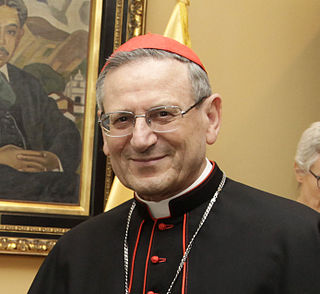
Angelo Amato, S.D.B., is an Italian cardinal of the Catholic Church who served as the Prefect of the Congregation for the Causes of Saints between 2008 and 2018. He served as Secretary of the Congregation for the Doctrine of the Faith from 2002 to 2008 and became a cardinal in 2010.
A pontifical commission is a committee of Catholic experts convened by the Pope for a specific purpose. The following is a list of commissions, the dates they began and the pope who established.

Salvatore "Rino" Fisichella is an Italian Catholic prelate with the rank of archbishop. He is the current pro-prefect for the New Evangelization section of the Dicastery for Evangelization. He was the president of the Pontifical Council for the Promotion of the New Evangelization from 2010 to 2022, and of the Pontifical Academy for Life from 2008 to 2010.

The papacy of Pius XII began on 2 March 1939 and continued to 9 October 1958, covering the period of the Second World War and the Holocaust, during which millions of Jews were murdered by Adolf Hitler's Germany. Before becoming pope, Cardinal Pacelli served as a Vatican diplomat in Germany and as Vatican Secretary of State under Pius XI. His role during the Nazi period has been closely scrutinised and criticised. His supporters argue that Pius employed diplomacy to aid the victims of the Nazis during the war and, through directing his Church to provide discreet aid to Jews and others, saved hundreds of thousands of lives. Pius maintained links to the German Resistance, and shared intelligence with the Allies. His strongest public condemnation of genocide was, however, considered inadequate by the Allied Powers, while the Nazis viewed him as an Allied sympathizer who had dishonoured his policy of Vatican neutrality.
The Antonianum, also known as the Pontifical University of Saint Anthony, and as Pontifical Athenaeum Antonianum, is a Franciscan pontifical university in Rome named in honour of Anthony of Padua. It is located in the Rione Esquiline, a block north of the Basilica of St John Lateran, at Via Merulana 124, near the intersection of Via Labicana/Viale Manzoni and Via Merulana.
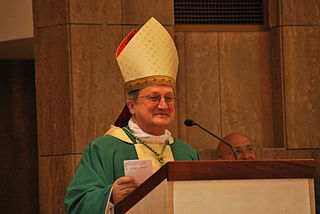
Enrico dal Covolo SDB is a Catholic bishop and Italian theologian, Assessor of the Pontifical Committee for Historical Sciences from 15 January 2019. He previously served as the rector of the Pontifical Lateran University from his appointment on 30 June 2010 until 2 June 2018. In addition he was also the postulator of the cause of canonization of Pope John Paul I from 2003 until 2016.














